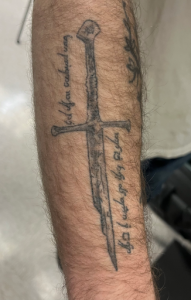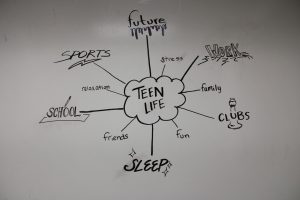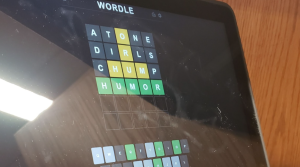Who Will Carry the Word?
April 15, 2019
In the performing arts hallway a scream pierces the usually quiet air. A student comes rushing out of a classroom to the stairwell. The scream quiets. Rehearsal resumes while the actors are still shaken from what they’ve heard.
This is Eaglecrest Harlequin Players who are rehearsing for their upcoming show “Who Will Carry the Word” from April 18-20. The play, set during WWII, at the Auschwitz concentration camp, is based on the true accounts of female French Resistance fighters who became friends and try to survive the horrific event.
The screams that echoed down the hallway came from Loren Palmer who is practicing the death scene of her character Claire. Claire is one of the main characters who, before her death, insists at least one of the women must survive to pass the true story on to the world.
Palmer stated, “In the show I scream because my character is getting beaten to death. It sounds awful.”
Rehearsals haven’t been easy. The demand to connect to a show that is so complex and dark in its theme and emotions leaves many in the class feeling drained.
“Since this show is so accurate to the depiction of life in a concentration camp, the story is extremely brutal and difficult to think about, watch, and act,” Caelan Echeverio, an actress in Harlequin, explained.
As actors, many of the students become fully immersed in what the script says during class rehearsals. Sitting in on scenes, it is hard to imagine the emotions and dialogue are scripted. The cast does an amazing job of pulling the audience in to this difficult and horrifying part of history.
Palmer continued, “The hardest part is like not crying 24/7 and separating the feelings from yourself and the character. It’s hard to take a step back and understand that this character isn’t who I am. It’s hard and super scary to allow those awful and deadly feelings to come to you. ”
No matter the part a character plays, everyone in this show has some importance because of the events they had to face.
Echeverio stated, “We also had to remind ourselves that we are not the character and we learned techniques to separate ourselves from them in order to prevent yourself from draining ourselves emotionally. It has been difficult to try to rehearse the way I’d like to perform without wearing myself out.”
Erin Cozort, Noah Pruitt, and Anton Karabushin, who are all students in the class, are directing the show. The scenes were split between all three of them meaning the cast got to work with three directors. This created, from an audience’s perspective, well-developed characters who felt like real people.
During one rehearsal for character development, the directors sat with the cast in a circle and began to ask them questions related to their characters. Before long students were crying as they began to see their characters life unfold before them.
“In rehearsals (among other exercises) I just wanted the actors to fully form the person they were portraying. What was the life that person lived? Why do they feel and act the way they do? For a lot of people, in order to properly act, they need to really know and be the person they are acting as,” Pruitt described.
These exercises are what give the emotional depth to the characters that puts the audience in this event with the actors.
“Now we are onto run throughs which still entails going through what each character was thinking when they said each line. Really it’s assigning this person a life while still keeping that emotional weight off of your heart. So it is a big process but all worth it,” Cozort stated.
Directing the show has led to many challenges as well. Splitting up scenes, designing exercises, planning blocking and shifts in vocal emphasis are what bring every piece of the show together and it falls to three people to make that happen.
“I think directing is unique from any other aspect of the show in the way that if you’re doing anything else, tech or acting, you are really building up the show. Whereas when you are directing you are really guiding the work,” Cozort explained. “You’re just taking the talent of others, your cast and crew, and putting it together on a platform where you can make it art.”
Putting every element of a show together is never easy, but the three directors seemed to have seamlessly split the work. While each director has their own style, they all stand behind a common theme for their scenes. The humanity and genuine nature of the women.
Cozort stated, “I wanted to convey really the humanity in these women and not just the tragic nature of their story but also just who they were and the story that they deserved to tell.”
Kat Tucker, technical director, is in charge of bringing this story to light. The set design created is simple and multipurpose so the set doesn’t have to change throughout the show.
“The set design was a way for us to define the space without us transforming the space.The most important part of tech would be the details.” Details are important as the audience will be sitting black box style. This means they will be sitting on stage in a semi circle while the actors perform the show around them.
But the show hasn’t been all work and no play. Walking into Harlequin it’s easy to see the students are more than just scene mates, they’re family.
Echeverio explained, “The easiest part has been working with my cast mates and feeling like I’m in a safe environment. Obviously this show is very hard, but with the love and support of my cast mates I feel like we are capable of making it amazing and sharing the message of the story.”
It’s clear that this cast and crew of students are well on their way to creating something that will leave a lasting impact on anyone who goes to see it.
“This show has let me see that art isn’t always this heavy symbolic, obstetric thing. [This show] made me rethink how I perceive art” Tucker expressed.
Opening night everyone is looking forward to seeing how the audience will react to seeing what these women faced and to feel the raw emotion that comes across so clearly in rehearsal.
Echeverio put it best, “Their messages need to be heard. People need to know what happened to them. I want them to understand their messages and see their humanity. The humanity that no one could ever take away from them. Everyone is human. Don’t treat anyone like they are not.”






